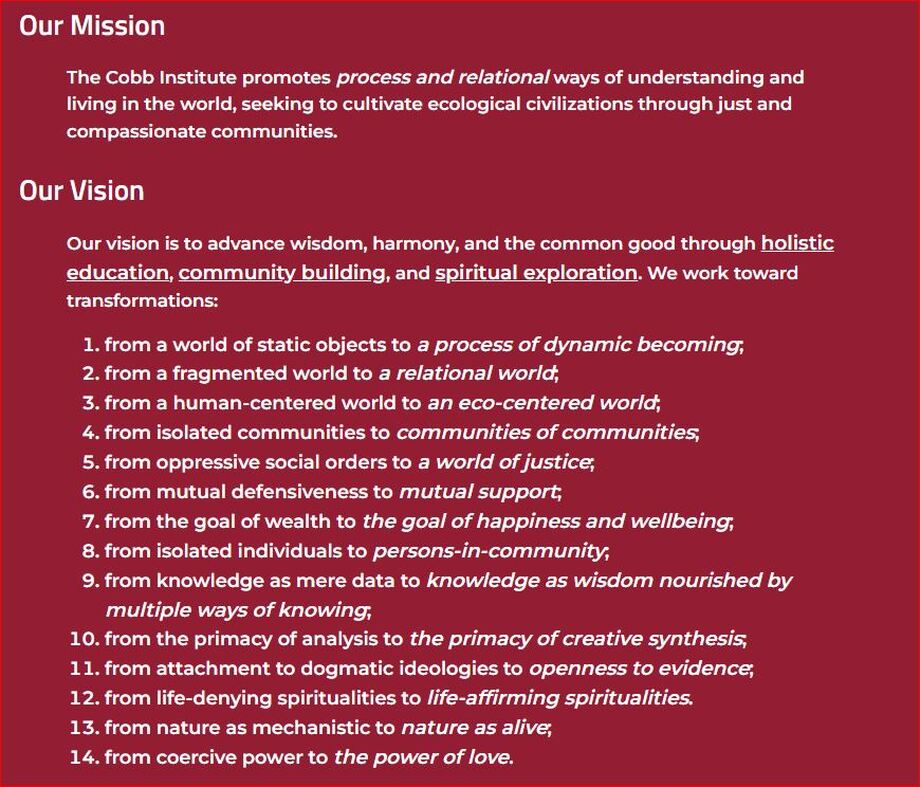Taking the Other To Lunch
Practicing Relationality in Tense Times
Those who embrace a process-relational approach to life are, or seek to be, agents of change. We want to nurture a cultural transformation from "mutual defensiveness to mutual care." This is one of fourteen transformations we seek in the world; see below for all fourteen.
A shift from defensiveness to care begins with ourselves. How to do this?
One way is to take the Other to Lunch: a practice described by Elizabeth Lesser in the TED talk below. If lunch is too much to handle, take the Other for coffee at a coffee shop such as the Nexus Coffee Company in Little Rock, Arkansas. The word "nexus" has a special meaning for process-relational thinkers. It refers to a group of individuals as gathered together in mutual feeling. This is what we in the process-relational world seek for ourselves and others.
Who is the Other? In the United States today, it's pretty obvious. If you are a Democrat, the Other is a Republican. If you are a Republican, the Other is a Democrat. If you find yourself disillusioned with both groups, you have two Others.
The lunch can be a beginning not an end. The need is not to agree, but it is to understand one another and become friends. You begin, in a quiet way, to care for your adversary. I borrow the phrase "care for your adversary" from a Board member of the Cobb Institute, Michael Witmer. He is attracted to process-relational ways of thinking because he believes, as do I, that they invite us to enter into a third-dimension amid conflict: a dimension where friendship includes but also transcends conflict in a spirit of mutual care.
I admit, the practice of Taking the Other to Lunch is not for everyone. It takes courage and strength to do it, and if you're in a situation of extreme vulnerability, it may not be possible or desirable.
A complementary and easier approach is not to take the Other to physical lunch, but to lift up the Other in the quietness of your heart in the Lovingkindness Meditation recommended by many positive psychologists and by scientists at Stanford and Yale. You might think of it as Taking the Other to Lunch mentally.
The meditation does not begin with the Other, but rather with yourself and loved ones, and then extends outward to include people who repulse you. It has been shows to produce positive emotions, relieve stress, increase resilience, and enrich capacities for affection. You will find a description of it at the bottom of this page.
The key is to do something to help effect a shift in your own mind and heart from defensiveness to care and then, so process-relational thinkers add, to work on the other transformations as well. If fourteen seems a bit too many, just consider the Four Hopes described below: whole persons, whole communities, a whole planet, and holistic thinking. The hopes are not for individual transformation alone, but for social transformation: a different kind of world that is good for people, other animals, and the Earth. Taking the Other to lunch, physically or mentally, is a place to begin.
- Jay McDaniel, July 4, 2022
A shift from defensiveness to care begins with ourselves. How to do this?
One way is to take the Other to Lunch: a practice described by Elizabeth Lesser in the TED talk below. If lunch is too much to handle, take the Other for coffee at a coffee shop such as the Nexus Coffee Company in Little Rock, Arkansas. The word "nexus" has a special meaning for process-relational thinkers. It refers to a group of individuals as gathered together in mutual feeling. This is what we in the process-relational world seek for ourselves and others.
Who is the Other? In the United States today, it's pretty obvious. If you are a Democrat, the Other is a Republican. If you are a Republican, the Other is a Democrat. If you find yourself disillusioned with both groups, you have two Others.
The lunch can be a beginning not an end. The need is not to agree, but it is to understand one another and become friends. You begin, in a quiet way, to care for your adversary. I borrow the phrase "care for your adversary" from a Board member of the Cobb Institute, Michael Witmer. He is attracted to process-relational ways of thinking because he believes, as do I, that they invite us to enter into a third-dimension amid conflict: a dimension where friendship includes but also transcends conflict in a spirit of mutual care.
I admit, the practice of Taking the Other to Lunch is not for everyone. It takes courage and strength to do it, and if you're in a situation of extreme vulnerability, it may not be possible or desirable.
A complementary and easier approach is not to take the Other to physical lunch, but to lift up the Other in the quietness of your heart in the Lovingkindness Meditation recommended by many positive psychologists and by scientists at Stanford and Yale. You might think of it as Taking the Other to Lunch mentally.
The meditation does not begin with the Other, but rather with yourself and loved ones, and then extends outward to include people who repulse you. It has been shows to produce positive emotions, relieve stress, increase resilience, and enrich capacities for affection. You will find a description of it at the bottom of this page.
The key is to do something to help effect a shift in your own mind and heart from defensiveness to care and then, so process-relational thinkers add, to work on the other transformations as well. If fourteen seems a bit too many, just consider the Four Hopes described below: whole persons, whole communities, a whole planet, and holistic thinking. The hopes are not for individual transformation alone, but for social transformation: a different kind of world that is good for people, other animals, and the Earth. Taking the Other to lunch, physically or mentally, is a place to begin.
- Jay McDaniel, July 4, 2022

